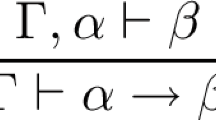Abstract
We investigate the first-order theory of closed subspaces of complex Hilbert spaces in the signature \((\vee ,\perp ,0,1)\), where ‘\(\perp \)’ is the orthogonality relation. Our main result is that already its quasi-identities are undecidable: there is no algorithm to decide whether an implication between equations and orthogonality relations implies another equation. This is a corollary of a recent result of Slofstra in combinatorial group theory. It follows upon reinterpreting that result in terms of the hypergraph approach to quantum contextuality, for which it constitutes a proof of the inverse sandwich conjecture. It can also be interpreted as stating that a certain quantum satisfiability problem is undecidable.
Similar content being viewed by others
Notes
See also the survey [10] for a more recent exposition from a geometrical perspective.
The formulation of [19] asks for the existence of a quantum model on H, but this is clearly equivalent: the existence of a quantum model requires the existence of a quantum representation to begin with; conversely, one can use a quantum representation and an arbitrary state in its underlying Hilbert space to obtain a quantum model.
See [31] for an introduction to von Neumann algebras from the perspective of quantum logic, including a treatment of their lattices of projections (Section 6.2).
Where as usual in von Neumann algebra theory, normal means continuous with respect to the ultraweak topologies.
References
Birkhoff, G., von Neumann, J.: The logic of quantum mechanics. Ann. Math. 37(4), 823–843 (1936)
Engesser, K., Gabbay, D.M., Lehmann, D. (eds.): Handbook of quantum logic and quantum structures—quantum logic. Elsevier, London (2009)
Kalmbach, G.: Orthomodular lattices. London Mathematical Society Monographs, vol. 18. Academic Press Inc, London (1983)
Kalmbach, G.: Measures and Hilbert lattices. World Scientific, Singapore (1986)
Svozil, K.: Quantum Logic. Springer Series in Discrete Mathematics and Theoretical Computer Science. Springer, Berlin (1998)
Piron, C.: Axiomatique quantique. Helv. Phys. Acta 37, 439–468 (1964)
Amemiya, I., Araki, H.: A remark on Piron’s paper. Publ. Res. Inst. Math. Sci. Ser. A 2, 423–427 (1966/7)
Wilbur, W.J.: On characterizing the standard quantum logics. Trans. Am. Math. Soc. 233, 265–282 (1977)
Solèr, M.P.: Characterization of Hilbert spaces by orthomodular spaces. Commun. Algebra 23(1), 219–243 (1995)
Stubbe, I., Van Steirteghem, B.: Propositional systems, Hilbert lattices and generalized Hilbert spaces. In: Handbook of Quantum Logic and Quantum Structures, pp. 477–523. Elsevier Sci. B. V., Amsterdam (2007). arXiv:0710.2098
Megill, N.D., Pavičić, M.: Hilbert lattice equations. Ann. Henri Poincaré 10(7), 1335–1358 (2010)
Megill, N.: Quantum logic explorer home page. http://us.metamath.org/qlegif/mmql.html (2014)
Mal’cev, A.I.: Algebraic systems. In: Smirnov, D., Taĭclin, M. (eds.) Posthumous Edition. Springer, New York (1973). Translated from the Russian by B. D. Seckler and A. P. Doohovskoy, Die Grundlehren der mathematischen Wissenschaften, Band 192
Bravyi, S.: Efficient algorithm for a quantum analogue of 2-SAT. arXiv:quant-ph/0602108
Liang, Y.-C., Spekkens, R.W., Wiseman, H.M.: Specker’s parable of the over-protective seer: a road to contextuality, nonlocality and complementarity. Phys. Rep. 506(1–2), 1–39 (2011)
Slofstra, W.: Tsirelson’s problem and an embedding theorem for groups arising from non-local games. J. Am. Math. Soc. Page to appear. arXiv:1606.03140
Cleve, R., Liu, L., Slofstra, W.: Perfect commuting-operator strategies for linear system games. J. Math. Phys. 58(1), 012202 (2017). arXiv:1606.02278
Cleve, R., Mittal, R.: Characterization of binary constraint system games. In: Automata, Languages, and Programming, Lecture Notes in Computer Science, vol. 8572. Springer, Berlin (2014). arXiv:1209.2729
Acín, A., Fritz, T., Leverrier, A., Sainz, A.B.: A combinatorial approach to nonlocality and contextuality. Commun. Math. Phys. 334(2), 533–628 (2015). arXiv:1212.4084
Lipshitz, L.: The undecidability of the word problems for projective geometries and modular lattices. Trans. Am. Math. Soc. 193, 171–180 (1974)
Sherif, M.A.E.H.: Decision problem for orthomodular lattices. Algebra Universalis 37(1), 70–76 (1997)
Herrmann, C.: On the equational theory of projection lattices of finite von Neumann factors. J. Symb. Log. 75(3), 1102–1110 (2010)
Herrmann, C., Ziegler, M.: Computational complexity of quantum satisfiability. J. ACM 63(2), 19 (2016)
Atserias, A., Kolaitis, P.G., Severini, S.: Generalized satisfiability problems via operator assignments (2017). arXiv:1704.01736
Fritz. T.: Curious properties of free hypergraph c*-algebras. J. Oper. Theory. Page to appear. arXiv:1808.09220
Peres, A.: Incompatible results of quantum measurements. Phys. Lett. A 151(3–4), 107–108 (1990)
Mermin, N.D.: Simple unified form for the major no-hidden-variables theorems. Phys. Rev. Lett. 65, 3373 (1990)
Pedersen, G.K.: \(C^{\ast } \)-Algebras and their Automorphism Groups, London Mathematical Society Monographs, vol. 14. Academic Press, Cambridge (1979)
Fritz, T., Netzer, T., Thom, A.: Can you compute the operator norm? Proc. Am. Math. Soc. 142, 4265–4276 (2014). arXiv:1207.0975
Hodges, W.: Model Theory, Encyclopedia of Mathematics and Its Applications, vol. 42. Cambridge University Press, Cambridge (1993)
Rédei, M.: Quantum Logic in Algebraic Approach. Kluwer Academic Publishers, Dordrecht (1998)
Svozil, K.: Randomness and Undecidability in Physics. World Scientific Publishing Co., Inc., River Edge (1993)
Acknowledgements
We thank John Harding, Christian Herrmann, Ravi Kunjwal, Anthony Leverrier, Mladen Pavičić, Stefan Schmidt, William Slofstra, Rob Spekkens, Karl Svozil, Andreas Thom and Moritz Weber for discussions. Special thanks go to Christian Herrmann for copious help with the literature and useful feedback, and to William Slofstra for pointing out that Theorem 14 actually follows from the arguments used in an earlier version of this paper to prove a weaker result. Most of this paper was written while the author was with the Max Planck Institute for Mathematics in the Sciences in Leipzig, Germany.
Author information
Authors and Affiliations
Corresponding author
Additional information
Publisher's Note
Springer Nature remains neutral with regard to jurisdictional claims in published maps and institutional affiliations.
Rights and permissions
About this article
Cite this article
Fritz, T. Quantum logic is undecidable. Arch. Math. Logic 60, 329–341 (2021). https://doi.org/10.1007/s00153-020-00749-0
Received:
Accepted:
Published:
Issue Date:
DOI: https://doi.org/10.1007/s00153-020-00749-0
Keywords
- Quantum logic
- Orthomodular lattices
- Hilbert lattices
- Decidability
- First-order theory
- Restricted word problem
- Finitely presented C*-algebra
- Residually finite-dimensional
- Quantum contextuality




